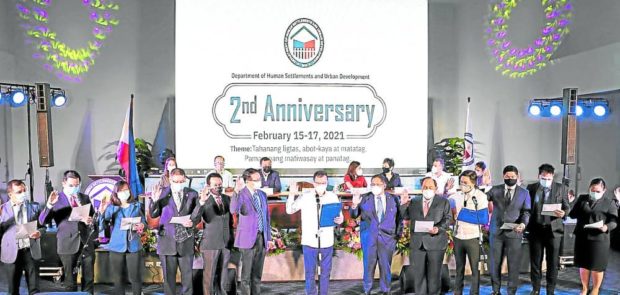Voice and conscience of the housing sector

OSHDP found the biggest promotional platform for its 6-point shelter agenda through the successful Affordable Housing Summit 2021, where more than 30 speakers from the real estate industry shared insights about first-time homebuying.
Whenever I talk about the state of housing in the Philippines, I can’t help but tell the story of Mang Jun Pineda.
Mang Jun has worked half his life as a utility personnel. Never in his wildest dreams did he think that he would eventually own a home because it was out of his reach. He used to move from one rental house to another to get the cheapest one available. He later realized that the rent he paid is almost the same as monthly amortization for a decent housing.
It was no surprise that he chose to invest his hard earned money to buy a house he could call his own.
This is the kind of story that I wish people would remember when they think of buying a home. I’m not saying buying or building a home is easy. It is not. Definitely, there are challenges.
I am saying one should never lose hope. In fact, there are a lot of people who are willing to help. One of them is our group called the Organization of Socialized and Economic Housing Developers of the Philippines (OSHDP).
Article continues after this advertisementAs the Filipino’s resolve to own a home remains strong, so does our spirit to give them the home they deserve.
Article continues after this advertisementVoice and conscience of the housing sector
Today, OSHDP holds the distinct reputation of being an effective and conscientious voice of the housing sector. The outcomes of its advocacies and initiatives ultimately redound to the benefit of the low and average income earners, the homeless and underprivileged.
Over the years, OSHDP made notable achievements in the housing industry.
It fielded private sector representatives to the former Housing and Urban Development Coordinating Council (HUDCC), and has been a constant resource person and representative of the sector in legislative hearings and executive sessions.
It was likewise the only representative of private developers that gave inputs to the finalization of the National Informal Settlements Upgrading Strategies (NISUS). It has made strong and persistent representation before the government in promoting ease of doing business.
OSHDP also took the lead in making in-depth proposals on price ceiling adjustment, which bears significance in setting the benchmark for granting incentives for and scaling up socialized housing development by the private sector.

DHSUD Secretary Eduardo Del Rosario administers the oath leads to 2021 OSHDP officers..
Advocating for dignified, decent and affordable housing
As the leading group of mass housing developers, OSHDP has taken initiatives to realize the role of the housing sector in helping revive the country’s economy and urges its members to fully contribute to this common effort.
Guided by its vision of “growth through dignified, decent and affordable housing,” OSHDP undertakes housing initiatives and advocacies through its “6-Point Shelter Agenda”.
These include:
(1) institutionalizing private sector participation under the Department of Human Settlements and Urban Development (DHSUD) by designating an active and permanent private sector representative to the National Human Settlements Board and all housing policy working committees;
(2) further easing doing business;
(3) expanding housing finance and sustainable incentive program for homebuyers;
(4) upholding fair access to land through a genuine national land use policy;
(5) redefining affordable housing; and
(6) promoting green building, resilient settlements, and postpandemic approach in designing spaces.
To promote this agenda, OSHDP conducted regular monthly business forums online. Since June last year, the group has conducted 23 webisodes of “Housing Talks” to help find solutions to current and urgent issues.
Recently, this shelter agenda found the biggest promotional platform through the successful Affordable Housing Summit 2021, where more than 30 speakers from the real estate industry shared insights about first-time homebuying. The two-day event was viewed and attended by over 20,000 people.
OSHDP, the Inquirer, and the Affordable Housing Summit 2021
Part of the success of realizing OSHDP’s 6-point shelter agenda is the consultation with and participation of the public, who are ultimately the stakeholders.
Public support is crucial in bringing forward all its advocacies, while the active participation of stakeholders is just as important in this process. It is through a collective effort that we can successfully find solutions to any crisis.
A trustworthy platform like Inquirer Property, having the widest readership in the country, would contribute to OSHDP’s goal of not only garnering support from the public, but also of soliciting valuable inputs that can be potentially helpful in its formulation of policy and program proposals.
In the advent of advanced technology especially in communications and social media, we see various advocacies gain popular support. Inquirer Property provides this platform to OSHDP, which has now gained significant reach not only within the country but also to Filipinos abroad.
We cannot discount the significance of print media despite the emergence of social media. While others prefer the convenience of viewing articles and news online, some stick to the conventional but efficient. There are nuances between the audiences of social media and print, but Inquirer Property can definitely bridge the gap.
Beyond the goal of reaching out to the public, OSHDP also aims to reach out to other housing developers and associations who wish to join the cause of affordable housing. Forging partnerships allows a productive exchange of housing and construction technology, innovations and best practices.
All these goals likewise led us to the successful hosting of the OSHDP Affordable Housing Summit 2021.
This virtual gathering provided a holistic approach in informing the public about all housing related concerns such as home financing, real estate investing, sustainable and innovative building approach, virtual home buying and selling, rights and responsibilities of homeowners, among others.
These are the kinds of initiatives that we hope to share to the public. We are confident that the partnership with the media, especially the Inquirer Property, will help bring this forward.
The author is the president of the Organization of Socialized and Economic Housing Developers of the Philippines (OSHDP)